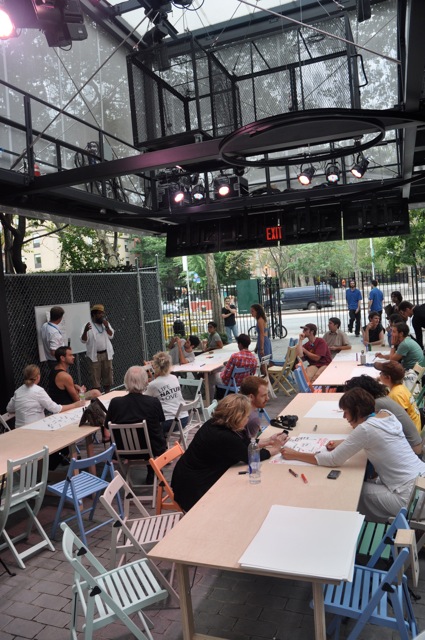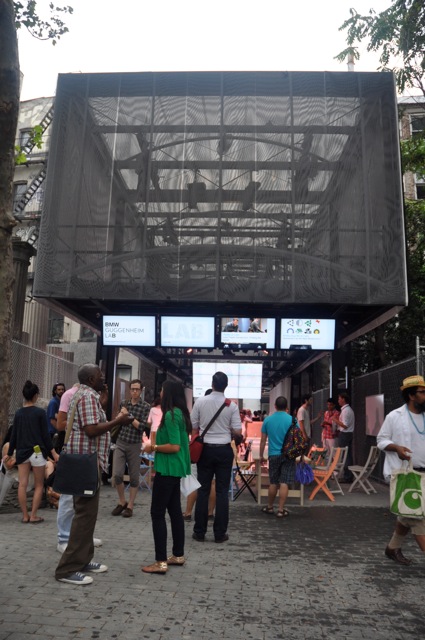 Brainstorming at the BMW Guggenheim Lab.Photo: Sarah GoodyearYesterday, I headed over to Houston Street in Lower Manhattan to check out the opening of the BMW Guggenheim Lab, a temporary mobile structure on a vacant lot that is billed as “part urban think tank, part community center and public gathering space.” The lab will be in New York until October before traveling to Berlin and Mumbai.
Brainstorming at the BMW Guggenheim Lab.Photo: Sarah GoodyearYesterday, I headed over to Houston Street in Lower Manhattan to check out the opening of the BMW Guggenheim Lab, a temporary mobile structure on a vacant lot that is billed as “part urban think tank, part community center and public gathering space.” The lab will be in New York until October before traveling to Berlin and Mumbai.
The pop-up space, designed by Atelier Bow-Wow, was airy and inviting, with the feeling of an open-air theater. It will be the site of workshops, screenings, experiments, performances, and more over the next several weeks, bringing together architects, designers, academics — and regular people. And as soon as it opened, it was drawing a decent crowd, even in a light rain (the space, while open at the ends, is protected from the elements).
When I showed up, I walked into the middle of an early session conducted by members of the consultation service Spurse. In keeping with the lab’s theme of “Confronting Comfort,” they had broken attendees into groups to discuss varying aspects of that most comforting and urbane beverage, coffee. People of all ages were sitting around tables making charts about every aspect of coffee, from the way it is produced and shipped to the cups in which it is consumed.
As each group reported back, the discussion ranged from colonialism to recycling to fossil fuels to capitalism to embodied energy. It was pretty heady and intellectual stuff.
So what does this have to do with making cities better (as my 9-year-old son pointedly asked me after sitting patiently through the whole thing)?
 The pop-up structure was erected in an empty lot on Houston Street.Photo: Nathaniel GoodyearI talked with Spurse’s Iain Kerr, who was facilitating the session. He said the brainstorming, which will be followed with a field session tomorrow that aims to put some of the ideas into action, is designed to transform the way people think about the problems facing us in the modern world.
The pop-up structure was erected in an empty lot on Houston Street.Photo: Nathaniel GoodyearI talked with Spurse’s Iain Kerr, who was facilitating the session. He said the brainstorming, which will be followed with a field session tomorrow that aims to put some of the ideas into action, is designed to transform the way people think about the problems facing us in the modern world.
“We want methodologies to come out of this,” he said. “We are dealing with a world we don’t understand. We need powerful tools to deal with this world.”
Kerr said that “it makes you laugh with terror and absurdity” to see people confronting problems like waste and pollution with a mindset left over from ages gone by. “All the ways we think and act are tied to ways of thinking that are almost Newtonian,” he said.
So, will the BMW Guggenheim Lab be an incubator for post-Newtonian real-world solutions? Or is it just a lot of academic theorizing in a beautiful corporate-sponsored space? Stay tuned.



